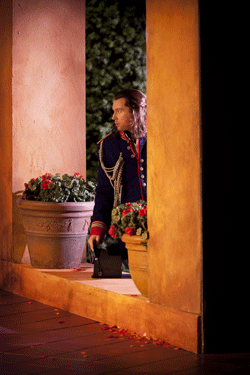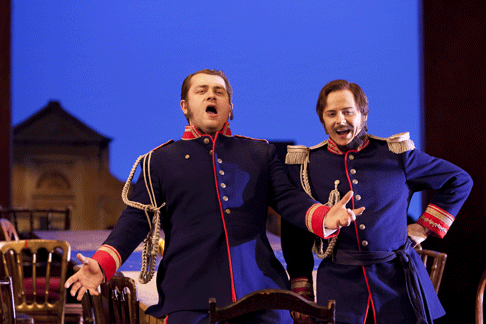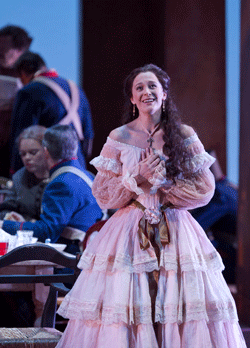![Sara Fulgoni as Beatrice [Photo by Johan Persson courtesy of Welsh National Opera]](http://www.operatoday.com/BB_WNO_14.gif)
28 Feb 2012
Beatrice and Benedict at the Wales Millennium Centre
Welsh National Opera presented a rather undercooked account of Berlioz’s tricky opera, in a revival of Elijah Moshinsky’s classic production
English Touring Opera are delighted to announce a season of lyric monodramas to tour nationally from October to December. The season features music for solo singer and piano by Argento, Britten, Tippett and Shostakovich with a bold and inventive approach to making opera during social distancing.
This tenth of ten Live from London concerts was in fact a recorded live performance from California. It was no less enjoyable for that, and it was also uplifting to learn that this wasn’t in fact the ‘last’ LfL event that we will be able to enjoy, courtesy of VOCES8 and their fellow vocal ensembles (more below …).
Ever since Wigmore Hall announced their superb series of autumn concerts, all streamed live and available free of charge, I’d been looking forward to this song recital by Ian Bostridge and Imogen Cooper.
The Sixteen continues its exploration of Henry Purcell’s Welcome Songs for Charles II. As with Robert King’s pioneering Purcell series begun over thirty years ago for Hyperion, Harry Christophers is recording two Welcome Songs per disc.
Although Stile Antico’s programme article for their Live from London recital introduced their selection from the many treasures of the English Renaissance in the context of the theological debates and upheavals of the Tudor and Elizabethan years, their performance was more evocative of private chamber music than of public liturgy.
In February this year, Albanian soprano Ermonela Jaho made a highly lauded debut recital at Wigmore Hall - a concert which both celebrated Opera Rara’s 50th anniversary and honoured the career of the Italian soprano Rosina Storchio (1872-1945), the star of verismo who created the title roles in Leoncavallo’s La bohème and Zazà, Mascagni’s Lodoletta and Puccini’s Madama Butterfly.
Evidently, face masks don’t stifle appreciative “Bravo!”s. And, reducing audience numbers doesn’t lower the volume of such acclamations. For, the audience at Wigmore Hall gave soprano Elizabeth Llewellyn and pianist Simon Lepper a greatly deserved warm reception and hearty response following this lunchtime recital of late-Romantic song.
Collapsology. Or, perhaps we should use the French word ‘Collapsologie’ because this is a transdisciplinary idea pretty much advocated by a series of French theorists - and apparently, mostly French theorists. It in essence focuses on the imminent collapse of modern society and all its layers - a series of escalating crises on a global scale: environmental, economic, geopolitical, governmental; the list is extensive.
For this week’s Live from London vocal recital we moved from the home of VOCES8, St Anne and St Agnes in the City of London, to Kings Place, where The Sixteen - who have been associate artists at the venue for some time - presented a programme of music and words bound together by the theme of ‘reflection’.
'Such is your divine Disposation that both you excellently understand, and royally entertaine the Exercise of Musicke.’
Amongst an avalanche of new Mahler recordings appearing at the moment (Das Lied von der Erde seems to be the most favoured, with three) this 1991 Mahler Second from the 2nd Kassel MahlerFest is one of the more interesting releases.
‘And there was war in heaven: Michael and his angels fought against the dragon; and the dragon fought and his angels, And prevailed not; neither was their place found any more in heaven … that old serpent … Satan, which deceiveth the whole world: he was cast out into the earth, and his angels were cast out with him.’
If there is one myth, it seems believed by some people today, that probably needs shattering it is that post-war recordings or performances of Wagner operas were always of exceptional quality. This 1949 Hamburg Tristan und Isolde is one of those recordings - though quite who is to blame for its many problems takes quite some unearthing.
There was never any doubt that the fifth of the twelve Met Stars Live in Concert broadcasts was going to be a palpably intense and vivid event, as well as a musically stunning and theatrically enervating experience.
‘Love’ was the theme for this Live from London performance by Apollo5. Given the complexity and diversity of that human emotion, and Apollo5’s reputation for versatility and diverse repertoire, ranging from Renaissance choral music to jazz, from contemporary classical works to popular song, it was no surprise that their programme spanned 500 years and several musical styles.
The Academy of St Martin in the Fields have titled their autumn series of eight concerts - which are taking place at 5pm and 7.30pm on two Saturdays each month at their home venue in Trafalgar Square, and being filmed for streaming the following Thursday - ‘re:connect’.
The London Symphony Orchestra opened their Autumn 2020 season with a homage to Oliver Knussen, who died at the age of 66 in July 2018. The programme traced a national musical lineage through the twentieth century, from Britten to Knussen, on to Mark-Anthony Turnage, and entwining the LSO and Rattle too.
With the Live from London digital vocal festival entering the second half of the series, the festival’s host, VOCES8, returned to their home at St Annes and St Agnes in the City of London to present a sequence of ‘Choral Dances’ - vocal music inspired by dance, embracing diverse genres from the Renaissance madrigal to swing jazz.
Just a few unison string wriggles from the opening of Mozart’s overture to Le nozze di Figaro are enough to make any opera-lover perch on the edge of their seat, in excited anticipation of the drama in music to come, so there could be no other curtain-raiser for this Gala Concert at the Royal Opera House, the latest instalment from ‘their House’ to ‘our houses’.
"Before the ending of the day, creator of all things, we pray that, with your accustomed mercy, you may watch over us."
![Sara Fulgoni as Beatrice [Photo by Johan Persson courtesy of Welsh National Opera]](http://www.operatoday.com/BB_WNO_14.gif)
Welsh National Opera presented a rather undercooked account of Berlioz’s tricky opera, in a revival of Elijah Moshinsky’s classic production
Throughout his career Berlioz had a rather distinctive way with the form of a piece, so it is perhaps inevitable that an opéra comique written by him would not be straightforward. Beatrice and Benedict is his final dramatic work, a piece that is small scale partly because Berlioz’s health would not allow him to write anything bigger and partly because that was what was suitable for a summer entertainment at the spa of Baden-Baden. Stagings of the piece are relatively rare so it was with great pleasure that I anticipated WNO’s performance of the opera, doubly so as it was to be a revival of Elijah Moshinsky’s 1994 production, beautifully designed by Michael Yeargan (sets) and Dona Granata (costumes).
 Robin Tritschler as Benedict
Robin Tritschler as Benedict
The work was performed in English with spoken dialogue adapted from Shakespeare’s play by Elijah Moshinsky and revival director Robin Tebbutt. Now the British, as a rule, are not very good at opéra comique, something awful seems to happen when the works cross the channel — Offenbach turns into G & S and anything more serious gets just plain embarrassing. Recent performances of the opera in London have tended to be concerts, in which the dialogue was either spoken by actors or replaced by a spoken narration, neither solution very satisfactory. With Beatrice and Benedict the problem is worse because people insist on trying to turn the piece back into a musical version of Much Ado About Nothing rather than sticking with a French opéra comique. In Cardiff we had dialogue cut to the bone, but spoken in a language which veered awkwardly between direct quotation from Shakespeare and more modern idiom.
I had heard wonderful reports of the original 1994 production Elijah Moshinsky production, but somehow the magic does not seems to have survived. The set looked lovely, ravishing in fact, with Paul Woodfield now in charge of Howard Harrison’s original lighting plot. But the set was designed for the far smaller stage of the New Theatre in Cardiff. And its rigidly architectural form meant that not only did the set look narrow, but sight lines were not ideal; it is a shame that somehow it could not have been opened up somewhat. The setting was 19th century Sicily, with the ladies in big crinoline dresses and an architectural loggia doing admirable service for all scenes in the opera.
Musically we got off to a good start with a sparkling account of the overture under Michael Hofstetter. The spoken dialogue got off to a bad start with Michael Clifton-Thompson’s Leonato having to deliver his lines with his back to the audience.
 Gary Griffiths as Claudio and Piotr Lempa as Don Pedro
Gary Griffiths as Claudio and Piotr Lempa as Don Pedro
Sarah Fulgoni’s Beatrice looked lovely and she spoke her dialogue quite aptly. But there was something of a mis-match between her nice, well-modulated speaking voice and the incredibly richly upholstered tones of her mezzo-soprano voice. Here was a Beatrice who, though intelligent and musical, simply failed to sound like the sharp-witted Beatrice that we expect. There were moments of great beauty, particularly in Beatrice’s long solo in Act 2 when she comes to accept that she loves Benedict, but the as a whole the character failed to take off. Perhaps, this is partly because there was simply too little spark between Fulgoni and Robin Tritschler’s Benedict.
If Fulgoni’s voice seemed overly rich for her role, Tritschler’s lyric tenor seemed in danger of being too light for Benedict. Under pressure his voice seemed to turn a trifle too reedy and you wondered whether this was ideal repertoire for him. He encompassed Benedict’s solos melodiously and was and entirely willing and capable actor. But the essential spark was not there, his relationship with Beatrice just didn’t crackle with energy the way it should.
Both Fulgoni and Tritschler were entirely capable, but unfortunately Donald Maxwell as Somarone gave us an object lesson in how to take control of the stage whether speaking or singing. Somarone the learned music master can be a rather tedious character and Maxwell did rather over do things by including topical references into his speeches. But as a demonstration of how to capture the attention of an audience, he could not be faulted.
 Laura Mitchell as Hero
Laura Mitchell as Hero
Laura Mitchell and Gary Griffiths played Hero and Claudio. Unfortunately in the opera Claudio is reduced to a cipher and as there is no one to impede their love, Hero has only to be delightfully in love. This Mitchell did beautifully, looking and sounding ravishing. She and Anna Burford as Ursula brought Act 1 to a ravishing close with their duet; one of the moments when music, drama and visuals came together in a moment of perfection which gave a hint at the pleasure the production must have given when new.
The role of Don Pedro is musically very small, but the character is quite a player in the spoken dialogue; Piotr Lempa, the only non-native English speaker in the cast, coped brilliantly nevertheless.
Under Michael Hofstetter the orchestra gave a sympathetic account of Berlioz’s score. Hofstetter’s biography in the programme book described him as a baroque specialist though he seems to have been venturing into wider water recently, with productions including Tristan und Isolde, and conducted Beatrice and Benedict at Houston Grand Opera in 2008.
This was one of the evenings in the theatre which does not quite catch fire, though nothing really goes wrong either. As Beatrice and Benedict is revived so rarely, I did so want it to be so much more; that said there were many incidental beauties along the way.
Robert Hugill